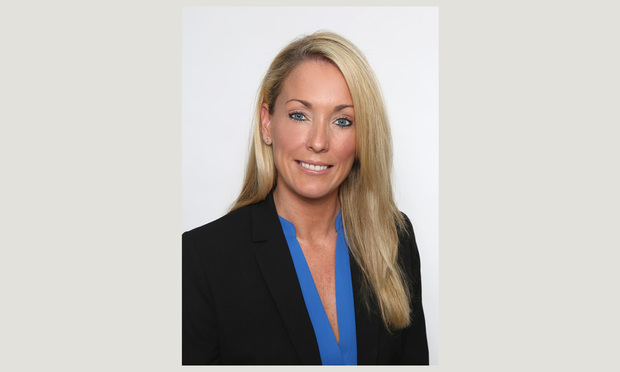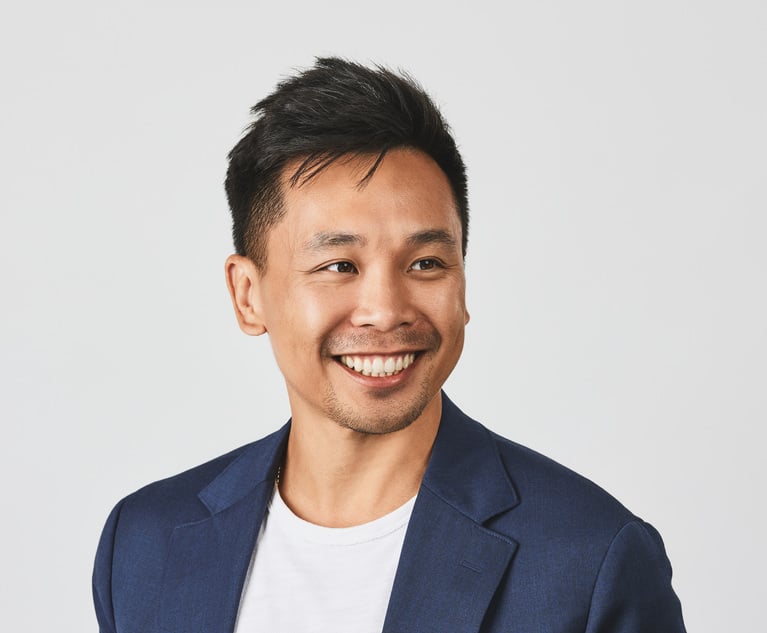General Counsel of Ethics Suite Wanted to Build the Whistleblower Platform of Her Dreams
Tricia Fratto, general counsel and co-founder of legal tech company Ethics Suite, talked with Corporate Counsel Monday about the employee misconduct reporting platform that provides an anonymous hotline channel between employers and workers.
January 13, 2020 at 04:26 PM
5 minute read
 Tricia Fratto, co-founder and general counsel with Ethics Suite. Courtesy photo.
Tricia Fratto, co-founder and general counsel with Ethics Suite. Courtesy photo.
Tricia Fratto, general counsel and co-founder of legal tech company Ethics Suite, went to undergrad and law school at night for 10 years while working days as a data administrator at IBM.
But it was a stint as a director of global investigations at a hotel chain that inspired the idea of her company. New York-based Ethics Suite is an employee misconduct reporting platform that provides an anonymous hotline channel between employers and workers.
Fratto talked with Corporate Counsel on Monday about her background, her company and trends in employee whistleblowing. The conversation below has been edited for clarity and brevity.
Corporate Counsel: Talk about your background, especially at International Business Machines Corp. and Starwood Hotels & Resorts Worldwide Inc.
Tricia Fratto: At IBM I was a database administrator; I didn't do legal work while I went to night school. It took 10 years, and I gave the longest resignation notice ever. Afterward I started in law firm practice [five years as a litigation associate at Sidley Austin], and I transitioned into white-collar investigations and regulatory compliance [joining Fulbright & Jaworski for three and a half years.] Then I went in-house at Starwood, where I supervised anti-bribery investigations worldwide, as well as training and other compliance matters.
Certainly the IBM experience, immersed in the technology and the corporate structure there as well as at Starwood, was very helpful.
CC: What made you want to start your own company?
TF: The right platform just didn't exist. We started the company to make our wish list a reality. Juliette Gust [president and the other co-founder of Ethics Suite] and I wanted to have a platform with every question we believe needs to be answered, but short enough not to be discouraging or too costly. And it had to assure anonymity for the employee.
I had worked with Juliette at Starwood [where she was project manager of its anti-corruption compliance program and former director of global fraud investigations]. She is also a forensic accountant. Together we have logged thousands of investigations and consulted on even more whistleblower complaints.
Just as important to us was making a platform that is acceptable to all companies. Such a hotline is required for public companies under the Sarbanes-Oxley Act. But we also are looking at companies that don't have to have a hotline but should have it. We wanted to offer a tool that is not as costly as others out there.
CC: Describe how your platform works.
TF: Employees can go onto the online platform, which is co-branded with the client, and report completely anonymously. We don't log IP addresses or anything. If someone wants to identify themselves, they have that option. They can upload any supporting documents. Each reporting employee gets a PIN number. The PIN number lets the company chat with and ask questions of the reporting employee without revealing who it is.
It's all data encrypted, protected and tracked while housing all related documents. That's important, so if the company gets a regulatory request, it can show exactly what it did and when.
CC: How many employees are in your company?
TF: Just the two of us, but we contract with consultants when we need to.
CC: Describe your duties as general counsel.
TF: My duties are administering to the company, overseeing our agreements, keeping current on privacy and other regulations, and interfacing with clients when they have legal questions. We also interface with clients on how to conduct an investigation, if they need support in that area. And we do training on how to use the system.
CC: How long have you been in business, and can you share any financial information?
TF: We have been in business three years in March, and we are growing well. We're in the mid-40s or more in number of clients. And we have licensed our product to a company in the Middle East that covers 10 or so countries there.
CC: What trends are you seeing in whistleblowing in 2020 and beyond?
TF: Workplace movements [equal pay, #MeToo, diversity] are certainly trending everything toward the reporting platforms. I think we'll continue to see employment groups being more active.
I hope the trend eventually will see employers less reactively putting these programs in place. Right now we see a lot of "I'm in litigation or I'm in the news media, and I know I need it." Maybe they can be more proactive before a situation spirals into something embarrassing or more costly.
CC: Is there anything you'd like to add?
TF: I mentioned anonymous reporting. Companies sometimes get nervous about that. They worry about getting frivolous complaints or ones they can't follow up on. There is new data showing that the substantiation rate for anonymous complaints is exactly the same as when someone identifies oneself. That's important for people to know.
They also need to know that getting reports is a sign of a well-functioning organization. It doesn't mean something is broken. In fact, just the opposite. If you get no reports, something is wrong and they [employees] don't trust you. Organizations need to do more outreach in this area.
This content has been archived. It is available through our partners, LexisNexis® and Bloomberg Law.
To view this content, please continue to their sites.
Not a Lexis Subscriber?
Subscribe Now
Not a Bloomberg Law Subscriber?
Subscribe Now
NOT FOR REPRINT
© 2025 ALM Global, LLC, All Rights Reserved. Request academic re-use from www.copyright.com. All other uses, submit a request to [email protected]. For more information visit Asset & Logo Licensing.
You Might Like
View All
Meta Hires Litigation Strategy Chief, Tapping King & Spalding Partner Who Was Senior DOJ Official in First Trump Term

Turning Over Legal Tedium to AI Requires Lots of Unglamorous Work on Front End
6 minute read
Law Firms Mentioned
Trending Stories
- 1Lavish 'Lies' Led to Investors Being Fleeced in Nine-Figure International Crypto Scam
- 2AstraZeneca Files Flurry of Lawsuits to Protect Cancer Treatment Drug
- 3American Airlines Legal Chief Departs for Warner Bros. Discovery
- 4New Montgomery Bar President Aims to Boost Lawyer Referral Service
- 5Deadline Extended for Southeastern Legal Awards
Who Got The Work
Michael G. Bongiorno, Andrew Scott Dulberg and Elizabeth E. Driscoll from Wilmer Cutler Pickering Hale and Dorr have stepped in to represent Symbotic Inc., an A.I.-enabled technology platform that focuses on increasing supply chain efficiency, and other defendants in a pending shareholder derivative lawsuit. The case, filed Oct. 2 in Massachusetts District Court by the Brown Law Firm on behalf of Stephen Austen, accuses certain officers and directors of misleading investors in regard to Symbotic's potential for margin growth by failing to disclose that the company was not equipped to timely deploy its systems or manage expenses through project delays. The case, assigned to U.S. District Judge Nathaniel M. Gorton, is 1:24-cv-12522, Austen v. Cohen et al.
Who Got The Work
Edmund Polubinski and Marie Killmond of Davis Polk & Wardwell have entered appearances for data platform software development company MongoDB and other defendants in a pending shareholder derivative lawsuit. The action, filed Oct. 7 in New York Southern District Court by the Brown Law Firm, accuses the company's directors and/or officers of falsely expressing confidence in the company’s restructuring of its sales incentive plan and downplaying the severity of decreases in its upfront commitments. The case is 1:24-cv-07594, Roy v. Ittycheria et al.
Who Got The Work
Amy O. Bruchs and Kurt F. Ellison of Michael Best & Friedrich have entered appearances for Epic Systems Corp. in a pending employment discrimination lawsuit. The suit was filed Sept. 7 in Wisconsin Western District Court by Levine Eisberner LLC and Siri & Glimstad on behalf of a project manager who claims that he was wrongfully terminated after applying for a religious exemption to the defendant's COVID-19 vaccine mandate. The case, assigned to U.S. Magistrate Judge Anita Marie Boor, is 3:24-cv-00630, Secker, Nathan v. Epic Systems Corporation.
Who Got The Work
David X. Sullivan, Thomas J. Finn and Gregory A. Hall from McCarter & English have entered appearances for Sunrun Installation Services in a pending civil rights lawsuit. The complaint was filed Sept. 4 in Connecticut District Court by attorney Robert M. Berke on behalf of former employee George Edward Steins, who was arrested and charged with employing an unregistered home improvement salesperson. The complaint alleges that had Sunrun informed the Connecticut Department of Consumer Protection that the plaintiff's employment had ended in 2017 and that he no longer held Sunrun's home improvement contractor license, he would not have been hit with charges, which were dismissed in May 2024. The case, assigned to U.S. District Judge Jeffrey A. Meyer, is 3:24-cv-01423, Steins v. Sunrun, Inc. et al.
Who Got The Work
Greenberg Traurig shareholder Joshua L. Raskin has entered an appearance for boohoo.com UK Ltd. in a pending patent infringement lawsuit. The suit, filed Sept. 3 in Texas Eastern District Court by Rozier Hardt McDonough on behalf of Alto Dynamics, asserts five patents related to an online shopping platform. The case, assigned to U.S. District Judge Rodney Gilstrap, is 2:24-cv-00719, Alto Dynamics, LLC v. boohoo.com UK Limited.
Featured Firms
Law Offices of Gary Martin Hays & Associates, P.C.
(470) 294-1674
Law Offices of Mark E. Salomone
(857) 444-6468
Smith & Hassler
(713) 739-1250







